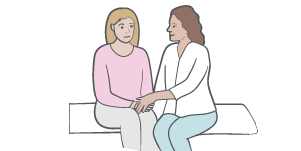Fostering Panel
After completing your assessment
When you have completed your assessment to become a foster carer, the social worker who has been most involved in your assessment writes a report, known as a Form F, which they will present to a fostering panel so that your approval can be fully considered.
Whether you apply to be a foster carer via your local authority, or a charity such as TACT, the involvement of a fostering panel is a standardised step to fostering approval.

Fostering Panel: What to expect
The thought of sitting in front of a panel may sound daunting and intimidating, but many of our foster carers have reported that panel members have gone out of their way to be welcoming and friendly. Panel members want to bring out the best in you. They want to hear from you the type of fostering you are interested in providing, and about your suitability to foster.
Additionally, your TACT social worker will be with you every step of the way to ensure that you are fully supported, and that you know what to expect.
The main purpose of the panel is:
- To consider individual fostering assessments and make a recommendation to TACT about the suitability of applicant/s to foster, as well as giving advice on the number and age range (approval criteria).
- To review the continued suitability of foster carers. The first annual review is referred to panel in line with fostering regulations.
“We found the application to foster process very simple, and we got a lot of support from our supervising social worker (SSW) around panel and how it works. Panel is a meeting held to consider an applicant’s request to become a foster carer, and it may sound intimidating, but it was done in a calm and professional manner.”
Gemma and Jenilee – TACT Foster Carers Since 2020
Read our Panel FAQs
Who sits on the fostering panel?
The fostering panel is a group of people who have a range of knowledge, skills and experience in respect of children who are looked after.
Why am I invited to attend the panel?
All applicants are expected to attend the panel with their assessing social worker.
These notes are intended to help you through the process, to know what to expect and how to prepare.
Why do I need to attend?
You are required to attend panel:
- To include you fully in the decision making process.
- To enable you to meet the people who make the decisions.
- To emphasise the importance of the decisions being taken.
- To show you and include you in, how we make these decisions .
- To obtain first-hand information from you, especially if the panel wishes to raise or clarify something that is not covered in your form F.
- To enable you to add anything to the written report if you wish to do so.
- To give you immediate feedback on the panel’s views.
What happens before the panel meeting?
We will give you a time and date for your application to be heard.
We recommend that you arrange to meet with your assessing social worker beforehand.
Two weeks before the meeting, the panel will receive a copy of your assessment or review. Panel members will make notes as they read these, especially in respect of strengths of the application/fostering experience and any issues they would like to explore in the meeting. The notes are sent to the chair who combines these into a single list and this is then discussed by the panel at the beginning of the meeting and questions for you agreed.
What happens during the fostering panel?
The panel administrator will arrange a test meeting with you in advance of the meeting so that you can see how to access the meeting and whether there are any potential IT issues. The panel administrator will contact you when panel are ready for you to join. Once your connection is made, the chair will welcome you and ask panel members to introduce themselves.
Part one of the meeting
The chair will explain the way the meeting works to you and check that you are happy with the recommendation of the assessment.
The chair will share a summary of the strengths identified in your assessment. Panel will explore a few issues with you to expand their understanding of what would make you an effective foster carer. The chair will ask your assessor if they have anything to add and then give you an opportunity to ask a question or add anything you think the panel need to take into account that hasn’t been included so far. The chair will ask you to leave the meeting. Your assessor will be asked to stay in case panel need any clarifications.
Part two of the meeting
The panel will discuss your assessment taking into account all the written information and your contributions at panel. The panel is independent of TACT and cannot make the decision on your suitability to foster and so it makes a recommendation to TACT. If this is a positive recommendation, they will also give advice on the number and ages of children. Should panel consider that they do not have all the information they need to make a recommendation they can defer and ask the assessor to undertake further work to inform an addendum which will be considered at another panel.
Once the panel have agreed their recommendation, the panel administrator will contact you to invite you to re-join the meeting. The chair will tell you the recommendation and the reasons for this. Once the minutes of the meeting are signed off they are sent to the agency decision maker (ADM) who is a senior director within TACT. They have the papers at the same time as panel and will consider these and the minutes before making a decision.
You will usually have the decision in writing within two weeks of the panel meeting.
Can I appeal a decision?
If the panel or decision maker does not feel able to recommend your approval, you will be notified in writing of this decision. You will then have 28 days in which to make written representations against this decision if you wish to do so. This written appeal will be shared with the decision maker and should state the grounds for review. The decision maker will refer the matter to fostering panel for further recommendation and you will be notified of the outcome.
Interested in fostering?
Find an information session near you.








